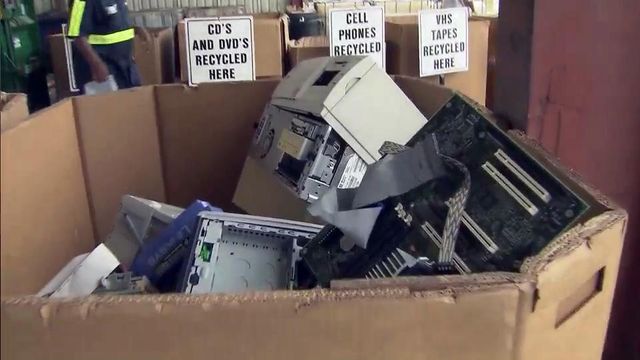Bill targets rules for electronics recycling, turtle sales
The annual regulatory reform bill, unveiled Thursday morning, takes aim at electronics recycling and energy efficiency requirements, as well as environmental rules and the state's long-standing ban on the sale of pet turtles.
Posted — UpdatedIn 2010, lawmakers voted to ban televisions, computers and other electronics from landfills in North Carolina and set up an electronics recycling program, funded by television and computer manufacturers through annual fees and contracts with recyclers to accept their products.
Sen. Trudy Wade, R-Guilford, a longtime opponent of the program, said Thursday there simply aren't enough recyclers in the state to handle the volume of televisions and computers being discarded. That's especially true in rural areas, where many counties don't have programs designed to collect them.
Adding to the problem is a downturn in the market for recycled electronics, discouraging growth in the industry.
"There's no money in it," Wade told the Senate Commerce Committee.
The result, she said, is that people are throwing their old electronics into woods or ditches because landfills can't take them. At least the landfills are lined, she pointed out.
"If recycling ever comes back and there’s a profit to be made, we can always change the law and go back to recycling," she said. "But right now, we have a bigger problem with them being abandoned and the possibility of having some kind of contamination because we don’t have anywhere to put them."
Tom Bean with the Environmental Defense Fund called lifting the ban "ill-advised."
"There are recyclers all across the state that have gone into business on the assumption that they could count on the state to keep this ban in place and provide them a stream of materials that they need for their businesses," Bean said. "Opponents of that are taking advantage of what’s probably a temporary market situation to repeal this ban."
The Sierra Club, which also opposes the provision, estimates electronics recycling currently supports around 600 jobs in the state.
Wade has criticized the program in the past as a "state mandate," requiring manufacturers to subsidize the electronics recycling sector.
According the Department of Environmental Quality, television manufacturers pay an annual fee of $2,500 to support the program and are required to "support the recycling" of televisions, usually by paying electronics recyclers to take them from county programs. Computer manufacturers pay from $7,500 to $15,000 per year, depending on whether they set up drop-off computer recycling sites.
The fees generate a little over $1 million a year for the state's electronics management fund, revenue that's funneled to counties to help fund their recycling programs.
Wade said recyclers can continue to do business – without the manufacturers' support.
"They still have the free market, and if they can compete and they can offer a business like Best Buy something – a good return on their dollar – they can go for it," she said. "There’s nothing in here that says you can’t recycle. It just says we’re going to open up the landfills because there’s not enough recycling to take care of all the volume of the TVs."
Two other sections of the bill would reduce energy efficiency requirements for buildings in the state.
One would exempt factories, storage facilities and other commercial buildings from the section of the building code that requires energy efficiency. Sen. Andrew Brock, R-Davie, said it's prohibitively expensive for owners of large factories with multiple loading bays or high ceilings to meet those requirements.
Another section would repeal energy efficiency requirements for state and university buildings, as well as a program that conducts energy audits on those buildings. Backers say energy efficiency targets have already been met, so the requirement is redundant. However, the Energy Policy Council recommended raising those targets in its recent annual report, citing savings to taxpayers of up to $2 billion in utility costs.
One provision in House Bill 169 would strike the state's longstanding ban on the sale of turtles as pets.
That law dates to 1975, the year that the U.S. Food and Drug Administration banned the sale of small turtles nationally. Tiny turtles were becoming a popular pet, but young children were contracting salmonella from them after putting them in their mouths.
On the recommendation of public health experts, the FDA banned the sale of any turtle with a shell smaller than 4 inches. North Carolina took it one step further, banning their sale, retail or wholesale, as pets in North Carolina. They can be sold only for research or as food.
Wade did not immediately respond to WRAL News' inquiry about the reason for lifting the ban.
The bill also repeals 10 of the annual reports required to be submitted to the Environmental Management Commission and reduces or combines 13 more. Committee staff explained that the EMC is inundated with scores of required annual reports, but most of the information is now available online.
Related Topics
• Credits
Copyright 2024 by Capitol Broadcasting Company. All rights reserved. This material may not be published, broadcast, rewritten or redistributed.





